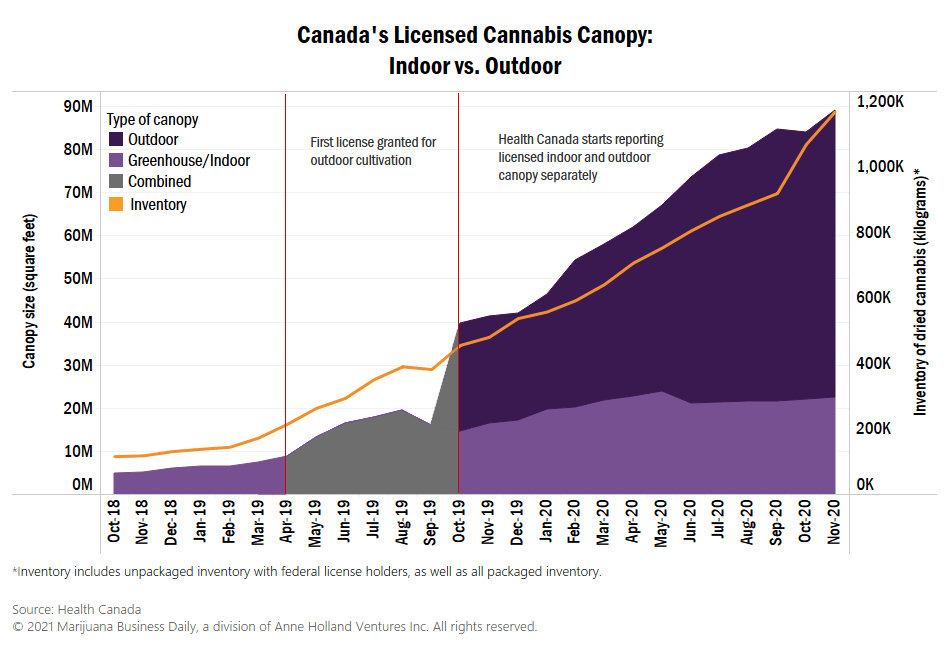Aurora Cannabis surrendered a greater share of Canada’s recreational market last year compared to rival licensed producers – with Canopy Growth not far behind – as the companies look to get back on track after a woeful 2020 that brought major financial losses, according to data contained in a new report.
The data – compiled by ATB Capital Markets, an investment banking and financial services firm, and digital retail platform Hifyre – details a shake-up among Canadian producers of all sizes in terms of adult-use market share.
In particular, the biggest cultivators generally held a flat or falling share of the market between the first quarters of 2020 and 2021, respectively, and smaller companies appear to have picked up more of those sales.
“It appears that some of the less well-known companies are gaining market share as some of the bigger companies are losing market share. That could be a function of bigger companies with more resources trying to understand the market better,” analyst David Kideckel said in a phone interview.
“It’s yet to be determined if this is a long-term trend or something that’s in transition at the moment.”
The data is part of an ATB Capital Markets report written by Kideckel and sent to investors last week.
Leamington, Ontario-based Aphria maintained its leadership of the Canada’s adult-use market with 14.9% market share in the first quarter of the year.
Aphria and Tilray, once united in a merger deal the companies agreed to in December, will control approximately 19% of the Canadian recreational cannabis market, according to the report. That’s down from a previous estimate of 22%.
Edmonton, Alberta-based Aurora led all licensed producers with 18.2% overall market share in the first quarter of 2020, but that share fell to 7.4% in the first quarter of 2021.
Kideckel’s report attributed the fall to a declining share of dried flower sales for Aurora.
“We note that Aurora is undergoing an operational turnaround with a new management team that is focused on improving the company’s presence in higher-margin premium segments, as opposed to maintaining share in value segments,” according to the report.
“In this instance, we note that premium dried flower in gaining share of the Canadian market, thus presenting an attractive opportunity for companies focusing on this segment.”
Aurora ended fiscal 2020 with a loss of 3.3 billion Canadian dollars ($2.6 billion).
A spokesperson for Aurora declined to comment.
Canopy focused on adult use
Smiths Falls, Ontario-headquartered Canopy also lost market share.
Canopy started 2020 with 15.5% of the market, but that fell to 11.6% to start 2021, according to the report.
Canopy lost approximately CA$2.3 billion in calendar 2020.
A Canopy spokesperson said in a statement that the company “continues to gain market share in the Canadian recreational market.”
The spokesperson said Canopy captured 15.7% of the market in its most recent quarter ended Dec. 31, 2020, and held the No. 1 position.
“We continue to strengthen our position in the Canadian recreational market through valuable additions to our brand portfolio like the recently announced acquisition of AceValley who holds top-five and top-10 market positions in Ontario across its range of SKUs,” the Canopy spokesperson said.
Other companies that lost market share, according to the report, include:
- Tilray, based in British Colombia, which went from 7.8% in the first quarter of 2020 to 4.2% in the first three months of 2021.
- New Brunswick-based Organigram, which tumbled from 8.6% to 4.3% over the same period.
- Toronto-based Cronos Group, which eased to 3.1% from 3.2%.
Hexo Corp., Redecan, Auxly Cannabis – all headquartered in Ontario – and British Columbia’s Village Farms International expanded their share over the past year, according to the data from Hifyre and ATB Capital Markets.
Hexo has big goal
The big winner was Hexo, which expanded its share of the overall market from 2.9% in the first quarter of 2020 to 6% one year later.
In a statement provided to Marijuana Business Daily, Hexo Chief Financial Officer Trent MacDonald said the company aims to be among the top two licensed producer in Canada as measured by adult-use sales.
“We’re proud of our results to date and have been working very hard to build market share organically while also being active in M&A,” he said.
Auxly grew its share from 2.1% to start 2020 to 3.1% one year later.
“We got here by achieving our goal of winning in cannabis 2.0, where we secured the number-one position for total market share in 2020,” CEO Hugo Alves said in a statement, referring to products such as vaporizers and beverages.
“We grew our 2.0 market share with a focus on quality, safety and efficacy, and are taking that same approach into branded 1.0 products in 2021 with an eye to continued growth.”
Redecan and Village Farms also fared well.
Redecan’s share of the market increased from 5.1% in the beginning of last year to 6.9% in the first quarter of this year.
Village Farms grew from 3.4% to 5.5% over the same time period.
Ottawa, Ontario-based Indiva’s market share grew from 0.9% in the first quarter of 2020 to 2.6% in the fourth quarter of 2020.
Matt Lamers is Marijuana Business Daily’s international editor, based near Toronto. He can be reached at matt.lamers@mjbizdaily.com.




